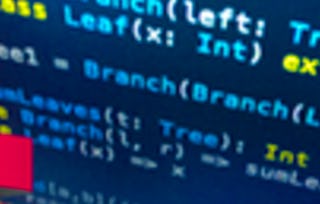Functional programming is becoming increasingly widespread in industry. This trend is driven by the adoption of Scala as the main programming language for many applications. Scala fuses functional and object-oriented programming in a practical package. It interoperates seamlessly with both Java and Javascript. Scala is the implementation language of many important frameworks, including Apache Spark, Kafka, and Akka. It provides the core infrastructure for sites such as Twitter, Netflix, Zalando, and also Coursera.

Functional Programming Principles in Scala

Functional Programming Principles in Scala
This course is part of Functional Programming in Scala Specialization

Instructor: Martin Odersky
220,321 already enrolled
Included with
8,268 reviews
Recommended experience
What you'll learn
Understand the principles of functional programming
Write purely functional programs, using recursion, pattern matching, and higher-order functions
Design immutable data structures
Combine functional programming with objects and classes
Skills you'll gain
Details to know

Add to your LinkedIn profile
31 assignments
See how employees at top companies are mastering in-demand skills

Build your subject-matter expertise
- Learn new concepts from industry experts
- Gain a foundational understanding of a subject or tool
- Develop job-relevant skills with hands-on projects
- Earn a shareable career certificate

There are 6 modules in this course
Get up and running with Scala on your computer. Complete an example assignment to familiarize yourself with our unique way of submitting assignments. In this week, we'll learn the difference between functional imperative programming. We step through the basics of Scala; covering expressions, evaluation, conditionals, functions, and recursion
What's included
8 videos7 readings7 assignments3 programming assignments
This week, we'll learn about functions as first-class values, and higher order functions. We'll also learn about Scala's syntax and how it's formally defined. Finally, we'll learn about methods, classes, and data abstraction through the design of a data structure for rational numbers.
What's included
8 videos5 assignments2 programming assignments
This week, we'll cover traits, and we'll learn how to organize classes into hierarchies. We'll cover the hierarchy of standard Scala types, and see how to organize classes and traits into packages. Finally, we'll touch upon the different sorts of polymorphism in Scala.
What's included
6 videos4 assignments2 programming assignments
This week we'll learn about the relationship between functions and objects in Scala; functions *are* objects! We'll zoom in on Scala's type system, covering subtyping and generics, and moving on to more advanced aspects of Scala's type system like variance. Finally, we'll cover Scala's most widely used data structure, Lists, and one of Scala's most powerful tools, pattern matching.
What's included
7 videos6 assignments2 programming assignments
This week we dive into Lists, the most commonly-used data structure in Scala.
What's included
6 videos5 assignments
After a deep-dive into Lists, this week we'll explore other data structures; vectors, maps, ranges, arrays, and more. We'll dive into Scala's powerful and flexible for-comprehensions for querying data.
What's included
7 videos4 assignments2 programming assignments
Earn a career certificate
Add this credential to your LinkedIn profile, resume, or CV. Share it on social media and in your performance review.
Instructor

Offered by
Explore more from Software Development
 Status: Preview
Status: PreviewÉcole Polytechnique Fédérale de Lausanne
 Status: Free Trial
Status: Free TrialÉcole Polytechnique Fédérale de Lausanne
 Status: Preview
Status: PreviewÉcole Polytechnique Fédérale de Lausanne
 Status: Free Trial
Status: Free TrialÉcole Polytechnique Fédérale de Lausanne
Why people choose Coursera for their career

Felipe M.

Jennifer J.

Larry W.

Chaitanya A.
Learner reviews
- 5 stars
83.54%
- 4 stars
13.51%
- 3 stars
1.70%
- 2 stars
0.66%
- 1 star
0.56%
Showing 3 of 8268
Reviewed on Jun 11, 2018
I really liked the course. Prof. Martin Odersky has a real talent of discussing some entangled problems at hand. I liked the programming assignments. I look forward to the rest of the specialization.
Reviewed on Jan 14, 2017
Content and the lecturing is super. All the assignments makes you think about the subjects. If you want to learn about functional programming and something about scala this is the course for you.
Reviewed on Aug 13, 2017
Great introduction to the principles of functional programming! Easy to follow lectures. Assignments challenging at times! Important: It feels like the assignment for week 4 should be after week 5.

Open new doors with Coursera Plus
Unlimited access to 10,000+ world-class courses, hands-on projects, and job-ready certificate programs - all included in your subscription
Advance your career with an online degree
Earn a degree from world-class universities - 100% online
Join over 3,400 global companies that choose Coursera for Business
Upskill your employees to excel in the digital economy
Frequently asked questions
This course covers the latest stable version of Scala. You can find the legacy version of the same course based on Scala 2 here.
To access the course materials, assignments and to earn a Certificate, you will need to purchase the Certificate experience when you enroll in a course. You can try a Free Trial instead, or apply for Financial Aid. The course may offer 'Full Course, No Certificate' instead. This option lets you see all course materials, submit required assessments, and get a final grade. This also means that you will not be able to purchase a Certificate experience.
When you enroll in the course, you get access to all of the courses in the Specialization, and you earn a certificate when you complete the work. Your electronic Certificate will be added to your Accomplishments page - from there, you can print your Certificate or add it to your LinkedIn profile.
More questions
Financial aid available,

